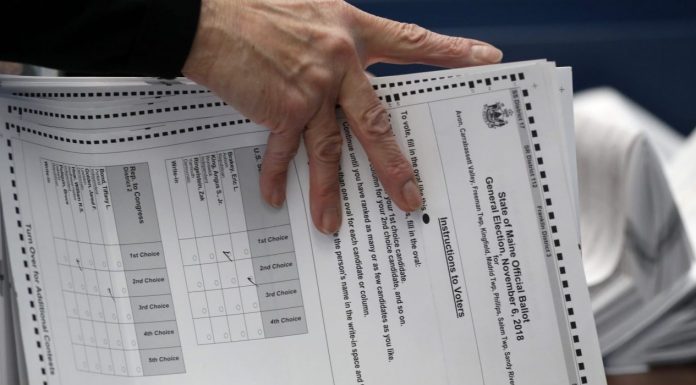(Headline USA) The U.S. Supreme Court on Tuesday turned away a last-ditch effort by the Maine Republican Party to stop its controversial ranked-choice voting from being used for the first time in the state’s presidential contest.
The decision not to intervene could effectively throw the tightly contested Senate race in which Sen. Susan Collins is seeking re-election into the hands of whichever party puts forth the most candidates rather than winning the most votes.
Justice Stephen Breyer rejected the request for the high court to intervene after the GOP sought to delay ranked voting in this November’s presidential election until state voters had the final say through a “People’s Veto” referendum.
The Maine GOP’s appeal was filed after the first votes had been cast by overseas voters. Additional ballots were being cast this week as more voters returned absentee ballots, either in person or by mail.
The appeal to the U.S. Supreme Court came after the state Supreme Judicial Court twice rebuffed the Maine GOP.
It focused on whether the Maine GOP collected enough signatures to force a referendum on a law expanding ranked voting to the presidential contest. The appeal contended some of the rules governing the collecting of signatures were unconstitutional.
The GOP contended the Maine Constitution required ranked voting in the presidential race to be delayed if it could show a likelihood of success on a lawsuit seeking to reinstate the referendum.
The ranked voting system, approved by Maine voters in 2016, has become a partisan issue after Republican U.S. Rep. Bruce Poliquin was ousted in 2018 despite collecting the most first-place votes.
Under the convoluted system, voters are allowed to rank all candidates in order of preference on the ballot. A candidate who wins a majority of first-place votes is the winner. However, if there’s no majority winner, then there are additional tabulations in which last-place candidates are eliminated and votes are reallocated to achieve a majority winner.
That means that a party poised to lose may gain additional leverage by running a multitude of independent or third-party candidates who will knock the frontrunner down lower in the rankings.
The voting system is already used in U.S. House and U.S. Senate races in Maine. It isn’t used in state gubernatorial or legislative races because of concerns that it runs afoul of the Maine Constitution.
In the race to unseat the centrist GOP Sen. Collins, the ballot is expected to include at least four candidates, with an additional three waging write-in campaigns.
Only one of the third-party candidates, Max Linn, has ties to the Republican party.
Of the four others, two of them—Lisa Savage and Ian Kenton Engelman—have actively given money to leftist organizations and candidates, according to the Federal Election Commission.
Two others, Douglas Fogg and Tiffany Bond, have been more cautious about broadcasting their political leanings. However, their personal Facebook pages reveal that both appear to endorse radical concepts like critical race theory.
Bond is a member of the Maine Black Lives Matter group, while Fogg—a middle school social studies teacher—supported reading controversial works like Robin Diangelo’s White Fragility, Ibram X. Kendi’s Stamped from the Beginning and Jill Lepore’s These Truths, as well as Karl Marx’s Communist Manifesto.
Should backers of the radical write-in candidates so desire, they could now rank Collins’s Democrat opponent, Sara Gideon, second among their choices, put Collins at the bottom of the list and deliver the tossup seat to Democrats even if Collins receives the most votes, thereby narrowing Republicans’ 53-seat senate majority.
Adapted from reporting by the Associated Press

